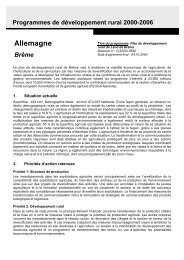B2B Internet Trading Platforms - EDIS
B2B Internet Trading Platforms - EDIS
B2B Internet Trading Platforms - EDIS
Create successful ePaper yourself
Turn your PDF publications into a flip-book with our unique Google optimized e-Paper software.
industries into the standardisation process in order to avoid standardisation efforts that only produce<br />
specifications that will not be practically implemented.<br />
2.3. Lack of trust in <strong>B2B</strong> electronic transactions<br />
Trust and confidence has, so far, been mainly addressed in the context of B2C e-commerce, under the<br />
aspect of consumer protection 9 . However, trust and confidence is a major issue also in the <strong>B2B</strong> field.<br />
Trust has always been the foundation of business relationships and e-commerce has further reinforced<br />
its importance. In general, many issues of trust in <strong>B2B</strong> are equivalent to B2C. The main difference is<br />
that the customer is a company instead of a private consumer and this may make the need for trust<br />
even more pressing, as the financial risk is often higher if something goes wrong with the transaction.<br />
In general, <strong>B2B</strong> relationships are characterised by a high degree of familiarity, often based on long<br />
established relationships, between suppliers and buyers. Statistical data 10 suggests that businesses are<br />
using e-business mainly to communicate more effectively with suppliers they already know. 68 % of<br />
companies purchasing on-line continued to work with existing business partners, while only 22 % of<br />
companies choose new suppliers. However, reaping the full benefits of e-business may be subject to<br />
the condition that companies transact with partners they have never met. Therefore, how to build trust<br />
with so far unknown suppliers can be a critical issue for the future success of e-business and in<br />
particular of open e-marketplaces.<br />
The Eurostat e-commerce survey confirms that the lack of trust is one of the most important barriers to<br />
the take up of e-commerce. In particular, enterprises cited that the most important barriers for e-<br />
purchasing are uncertainties about contracts, delivery and guarantees (23 %) and uncertainties about<br />
payments (21 %). For on-line selling, the perceived lack of trust on the side of the customer ranks as<br />
second most important barrier, as regards payments (20 %) and contract terms of delivery and<br />
guarantees (17 %).<br />
In addition, the open consultation of the Enterprise Directorate-General on <strong>B2B</strong> related trust issues,<br />
conducted between March and May 2002, confirms that the most important trust barriers for the use of<br />
e-marketplaces for on-line purchasing, as perceived by companies, are the uncertainties related to<br />
confidentiality of sensitive data (60,7 %), the lack of clear information on the terms and conditions of<br />
the contract (57,1 %), the uncertainties related to security issues (55,4 %), to on-line payments<br />
(51,8 %) and to the settlement of disputes (51,8 %). The most important trust barriers to the use of e-<br />
marketplaces for on-line selling are the uncertainties related to the confidentiality of sensitive data<br />
(58,9 %), to security issues (51,8 %) and to the settlement of disputes (51,8 %). In addition, the lack of<br />
transparency and clear rules for auctions has been identified as a major trust barrier for SME<br />
participation is such business model. This clearly confirms that trust is also an issue for <strong>B2B</strong> as well as<br />
for B2C. A detailed analysis of the results of the consultation is annexed to this paper (Annex 3).<br />
In general, the trust challenges in <strong>B2B</strong> electronic exchanges may differ according to the specific<br />
business model and on the type of functionality it offers. For example, on-line auctions may raise<br />
specific concerns related to the nature of this business model as a tool to reduce prices. In addition, the<br />
trust issues are different according to whether the business partners already know and trust each other.<br />
In case the business partners are well established and known in the off-line environment, the main<br />
trust issue concerns the security of the electronic communication systems. If the business partners are<br />
previously unknown to each other the trust issues concern both the identity and creditworthiness of the<br />
business partner as well as the transaction process.<br />
9<br />
10<br />
The E-confidence initiative was launched in May 2000, to address the problem of consumer trust and<br />
confidence in e-commerce. A group of consumer and industry stakeholders has been established to<br />
discuss the main issues at stake and as a result an agreement has been reached between UNICE and<br />
BEUC on a set of commonly agreed guidelines. The Commission intends to adopt a Recommendation<br />
on the basis of the agreement. http://econfidence.jrc.it/default<br />
PricewaterhouseCoopers “Trust not built at e-speed” Trust issues in European b2b e-procurement<br />
21





